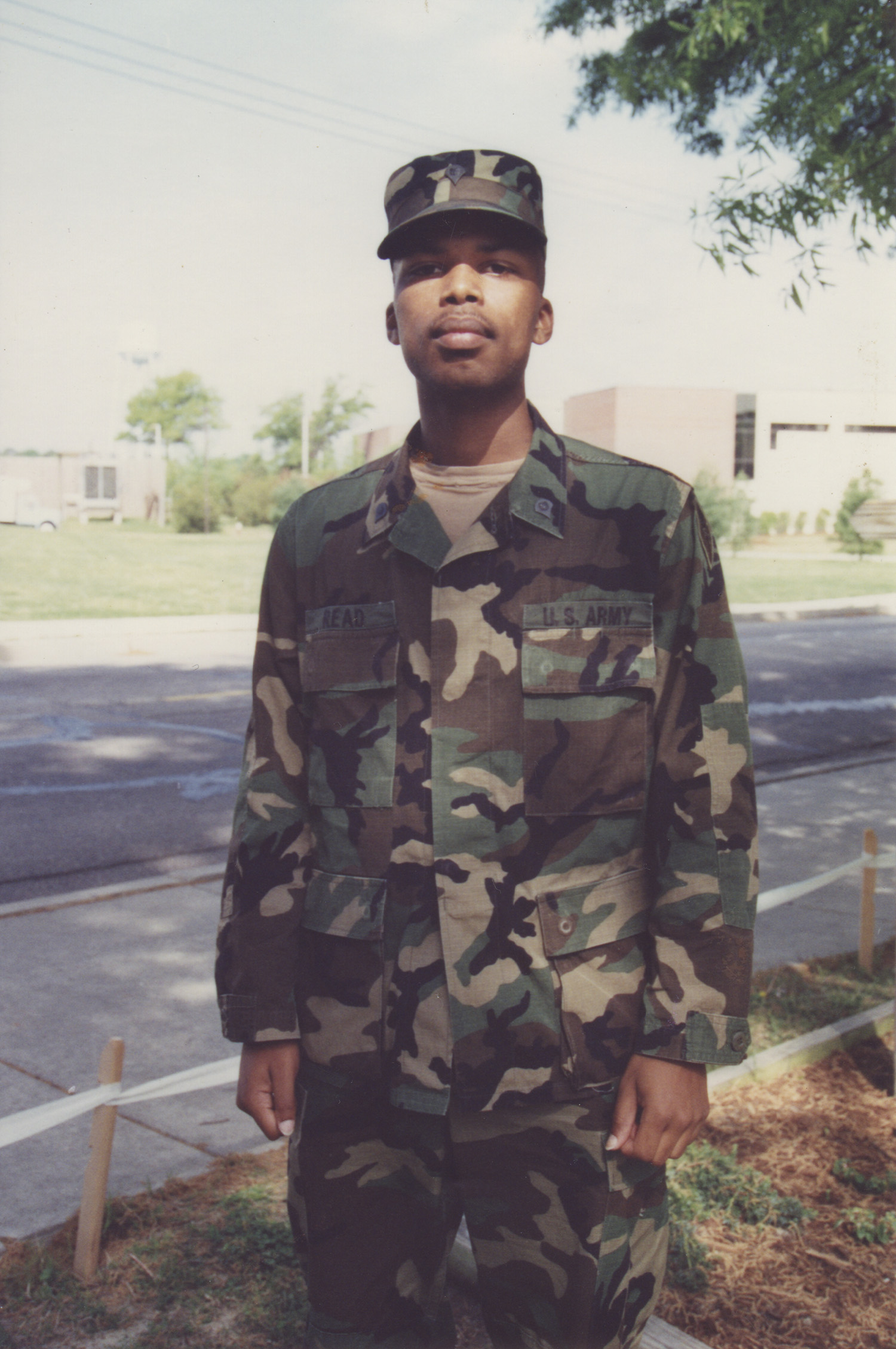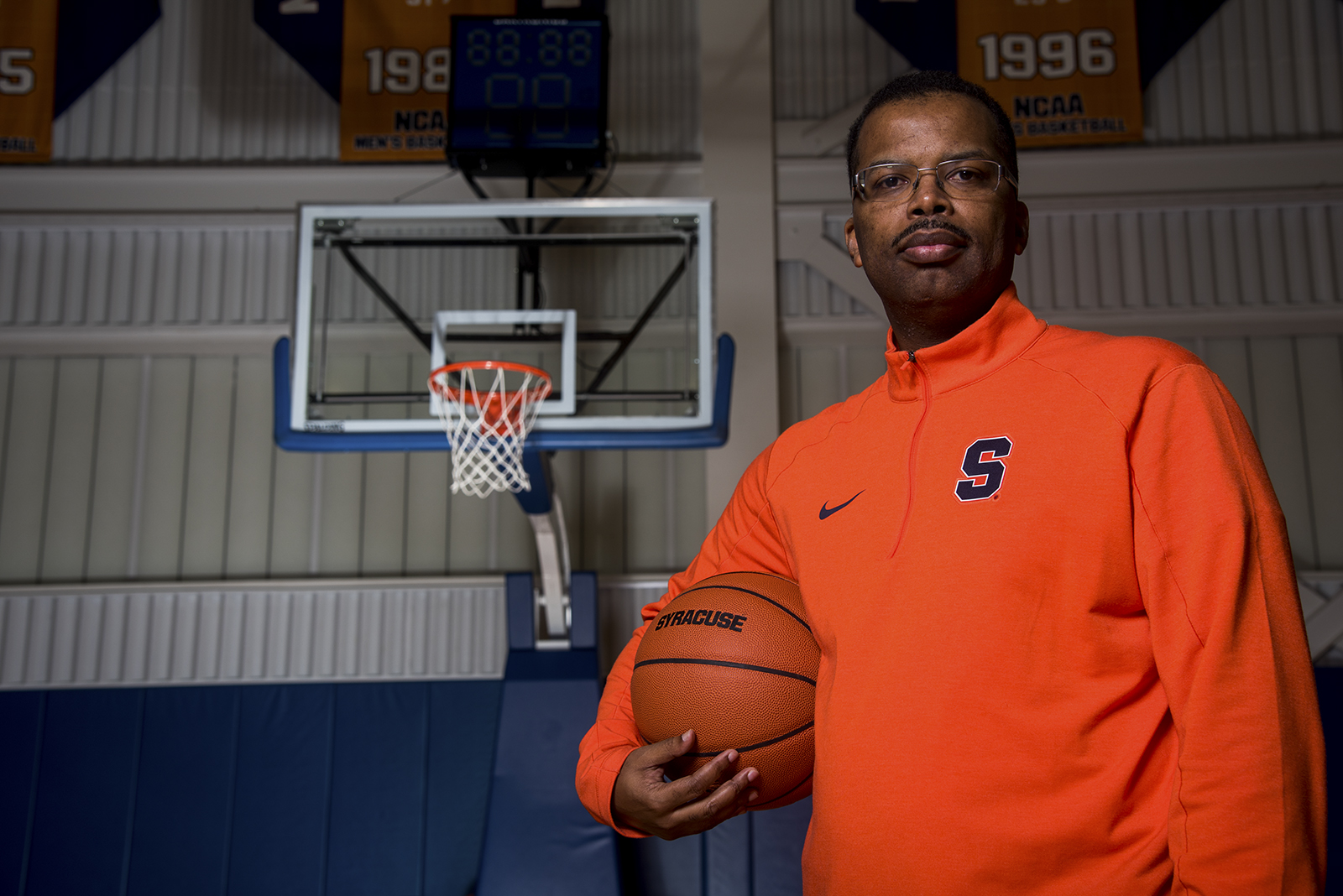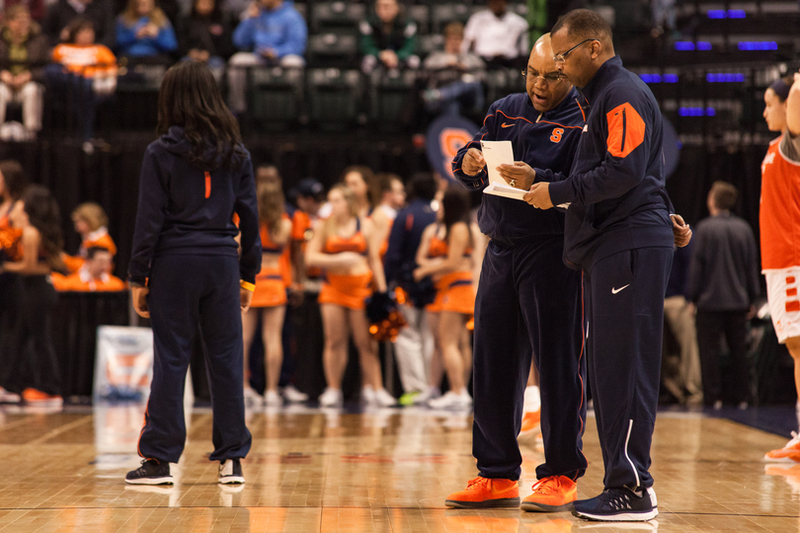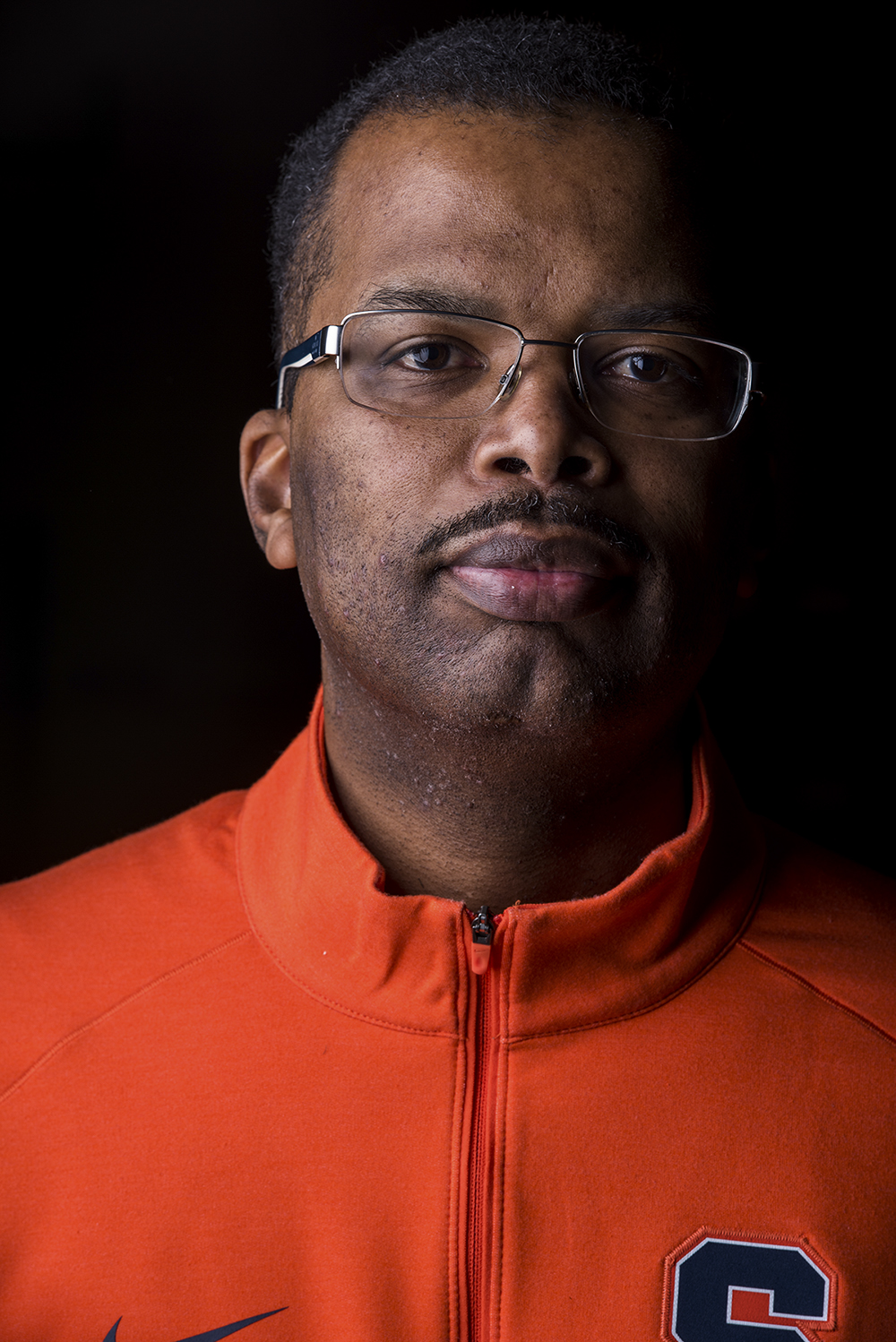A
ll the privates in one of the training units at Fort Jackson, South Carolina piled into a room. They were about four months into their initial training for their army careers and two weeks away from shipping out to their first duty stations.
One after another, the drill sergeant called each private’s name followed by a location. Soon it was Vonn Read’s turn.
Private Read. Fort Drum, New York.
“Everyone was just like, ‘Ah, man, New York. How did you get that, man?” Read said of how the other soldiers were jealous. “And I’m like, ‘Yes!’”
Read pulled out a map, scanning it with his finger to figure out where in New York he’d be.
Brooklyn. “No.”
Queens. “It ain’t there.”
He searched through central New York before finally finding the letters penciled in up by the Canadian border.
“‘I don’t know who you pissed off, but you sure did a good job,’” the drill sergeant said, smacking his hand down on Read’s shoulder. “‘Good luck there, man.’”
Before Read became an assistant coach for the Syracuse women’s basketball team in 2011 and helped lead it to its first-ever national championship game appearance last season, he was a private and specialist in the United States Army.
Read served as a supply clerk, in charge of his unit’s stock of everything from pens and paper to armored vehicles and ammunition. He served from when he enlisted on Nov. 8, 1989, until he was honorably discharged on June 2, 1993. Read was stationed at Fort Drum, located about an hour and 15 minutes north of Syracuse, for about a year and six months with a field artillery unit before reenlisting and transferring to Fort Lee, Virginia.
Syracuse opens its season Friday against Rhode Island on Veterans Day. Read’s written six books about basketball, served as an advanced scout in the NBA and WNBA and developed into the Orange’s Xs and Os guru, preparing every scouting report. Discipline and order that the military thrust into his life made the success of his basketball coaching career possible.
“It was the best thing. It was exactly what I needed,” Read said. “… Same situation, I would want the same thing because it really shaped me.”

Courtesy of Vonn Read
R
ead grew up in his grandparents’ house with his sisters in Milwaukee, Wisconsin. His mom, a single parent, worked two jobs and could hardly afford food, clothing and shelter for her children. Read moved in with his grandparents when he was about 6 or 7. He never had a relationship with his father.
Watching basketball games on TV late at night with his grandparents spurred Read’s interest in sports. His grandfather worked in a factory, and his grandmother operated the family-owned bar. They provided for the family but that left Read and his sisters to handle themselves at times.
“We had everything all the other kids had, which before that we didn’t,” Read said. “But because of that, I didn’t necessarily get the structure or the discipline that I needed to be able to have.”
He only raised his grades in time to be eligible for sports. He’d sometimes skip academic classes to spend several periods in gym class. He’d get Cs on surprise tests, but kids who paid attention received Ds. Each report came back with the same comment: Extremely smart but doesn’t apply himself.
“You can do anything you want to do,” Read’s grandmother, who he called mom, told him. “You just won’t do it.”
He decided late in high school he wanted to go to college and joining the military was the only way he could afford it because of the G.I. Bill.
Read eliminated the Navy because he couldn’t swim, the Air Force because flying planes required more smarts than he thought he had and the Marines because they were “definitely going to war all the time.”
“The army was the safe and easy bet for me,” Read said.
His grandmother also wanted to make sure Read stayed out of trouble. Shipping him off to the army became a way to do that. “Either you get right or you get out,” was her saying.
The Army sent Read to the cold weather training unit at Fort Drum. Within two hours of landing on the base, he joined his unit in the field on what Read remembers to be a minus 20-degree day. They handed him his equipment, including a Gore-Tex jacket, boots, several pairs of gloves and hats. He’d wear multiple hats and gloves at a time. It was all white instead of the standard Army green because he trained in the snow.
Roughly 80 percent of the unit’s time was spent in the field, Read estimates. Its motto revolved around the idea that the colder it was, the more the unit should be outside.
The soldiers slept in tents with just a mat to create a layer between the ice and sleeping bags. Heaters warmed the tents but would sometimes break.
They ran 6-7 miles each day, the sweat freezing into a solid chunk on the inside of their facemasks almost as quickly as it was produced and making it impossible to see.
A new private from Florida joined the unit and didn’t show up outside for formation his first day amid a blizzard when the unit took roll call.
“‘We go outside in this weather?’” Read remembers the soldier asking. “Yes, that’s what we do.”
Three days later, he left the Army. He told Read he couldn’t adapt.
The Army didn’t physically challenge Read, but it did mentally. He never got used to the cold or cleaning muddy vehicles in 2-degree weather. Read disliked manning the perimeter of the unit’s camp in the middle of the night, sitting in a fox hole with just a rifle and his thoughts, counting the minutes go by.
For about six weeks, Read ran 12 miles every afternoon. A commanding officer Read only remembers as Captain Valerio forced Read and another private to train for marathons with him. He didn’t know why he ran with Valerio, just that he had to. Read believes they were both new to the Army and didn’t meet Valerio’s standard.
The trio started around 2 p.m. each day but within seconds, Valerio blew past them. Read and the other private finished the runs together. At the next physical training test, Read sprinted the entire 2-mile course. He improved from the top 15 percent to second overall. Valerio said he taught them the “overload principal” — doing more than required to make it easier when you drop back down.
“It was just awful and I just said, ‘Man, when I get out of here I will never run again,’” Read said of running in the cold. “And I pretty much kept to that. I don’t. People say, ‘Well, you want to go for a run?’ No, I’m kind of shell shocked a little bit still from that. I don’t run to this day. I walk.”
He called home six months into his tenure, asking his grandmother if he could come home. She said no.
“Things got to get done and you got to do it,” Read said. “There was no other way. … Either you were going to do it or you were going to go to jail. Jail was not an option for me so I had to do it.”

Tony D. Curtis | Staff Photographer
R
ead filled his room at Fort Drum with basketball games recorded on VCR tapes and different plays drawn out on paper. Read watched and diagrammed plays when he wasn’t working. His liked watching Dean Smith and North Carolina the most.
“‘Pat Riley,’” other soldiers called him, jokingly, referring to one of the NBA’s most prolific and successful head coaches at the time. “‘And he got no team to coach. Pat Riley.’”
That stayed true until they asked him to coach the unit team that competed on the base. Read was the youngest in the unit, but he knew the sport, and his fellow soldiers knew it. Normally, a private would never coach a team.
Read claims he could’ve put in the entire NCAA championship-winning UNC system, but instead stuck with a few sets on offense and defense, along with two to three out-of-bounds plays.
He had one player, Reggie, who would show up late to the games, take a free throw one-handed with each hand to warm up, then score 40 points in the game. Read learned his first lesson as a coach quickly: the better players you have, the better coach you are.
Just get the ball to him and let’s do it. On three.
W
hen Read arrived at Fort Lee, the army assigned Curtis Davis to be Read’s supervisor. Davis believed in spit-shined boots, a pressed uniform and low haircut. He “didn’t mind” stripping soldiers of their rank or restricting them to the barracks for two weeks, which he did “a whole lot.”
“Read was smart because he saw the type of person I was, and I never really had any problems out of him,” said Davis, who spent 22 years in the military and oversaw thousands of soldiers. “He was one of the best soldiers I had.”
Read asked his superior for advice and to talk about Read’s mother. They talked about Read’s future plans for college, and played basketball one-on-one in their combat boots.
He turned into a leader, not only for the hundreds of training soldiers that cycled through the base every few weeks, but to his roommate, Leonard Farlow, as well. The two were the same age, but Farlow was newer to the military and looked to Read to learn how to press his clothes, carry himself and do his job.
After three years and nearly seven months in the military, Read left for college at Alabama A&M. When the school sent Read’s report card home after his first semester, his grandmother assumed there must have been some sort mistake. It said Read earned a 4.0 grade point average. But in her mind nothing had changed.
“Those computers are messing up everything,” she told Read’s sister. “This says Vonn got straight A’s.”
So she called him.
How did you do in school? Pretty good.
Well, what were your grades? I got straight A’s.
Well that’s what your report card said too, but I just wanted to call to be able to confirm.
“It was night and day,” Read said. “… The military did what it was supposed to do. It gave me focus and gave me discipline. It taught me to be able to progress to my next profession.”

Tony D. Curtis | Staff Photographer
T
wenty minutes after Syracuse beat Army in its first hosted NCAA tournament game in March, Read had already escaped the locker room. The other players and coaches had stayed while he indulged in Albany game film back in his office at the Carmelo K. Anthony Basketball Center. SU would play the Great Danes two days later.
Read spent the next 12-13 hours, analyzing film, creating a scouting report and preparing SU’s game plan, finishing up at 6:30 a.m., just in time for the coaches meeting at 7. He does every scouting report for Syracuse, though most teams split the work up between the coaches.
“You prepare or you perish,” Read said. “And all you could do is the very best preparation and either that’s going to be good enough or it’s not.
“I don’t ever want to be in a position to where I’m responsible for letting the players down because we’re not prepared for something.”
Read diagrammed 18 zones sets Albany runs in SU’s scouting report. Hillsman said the Great Danes couldn’t have run that many. Read identified about 26 but only wrote down 18 because he knew Hillsman would complain.
“He is the best in the business. He leaves no stone unturned,” Hillsman said. “… Coach Read is a star for us and I trust him.”
Read doesn’t have any mementos from his time in the army. He thought he still had his uniform, but never found it while moving houses this summer.
All that’s left is his DD form 214, his official discharge paper, laden with a circular coffee stain across the bottom left side.
But the army is in his binders — five-ring behemoths which can fit more than 1,000 pages — covering everything from offensive and defensive schemes to how Read would run a program if he ever gets the chance at a head coaching gig. He keeps several in a cabinet above his desk in his office and dozens more at home.
It’s in the way he starts and ends practice, forcing the team to clap together and end on the same beat, repeating it dozens of times if necessary until the players get it right.
It’s in the way he prepares, meticulously overloading in fear of any missed detail.
“This is how you do it,” Read said. “There’s no other way but this way.”

Tony D. Curtis | Staff Photographer
Banner photo by Tony D. Curtis | Staff Photographer
Published on November 9, 2016 at 11:11 am
Contact Jon: jrmettus@syr.edu | @jmettus



